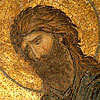

| Previous day | Next day |
| Old Style
August 29
|
Sunday |
New Style
September 11
|
|
12th Sunday after Pentecost.
Tone 3.
Strict fast. |
Wine and oil allowed.
|
![]() The Beheading of the Glorious Prophet, Forerunner, and Baptist John (ca. 28).
The Beheading of the Glorious Prophet, Forerunner, and Baptist John (ca. 28).
Sts. Candida (418) and Gelasia (422), of Constantinople. St. Sebbi, king of Essex and monk (ca. 694). St. Theodora, nun, of Thessalonica, who was from Aegina (892). New Martyr Anastasius (Spaso) of Strumica, at Thessalonica (1794). New Martyr Theodore Ivanov of Tobolsk (1937). Commemoration of all Orthodox soldiers killed on the field of battle. St. Arcadius of Arsinoe, Cyprus, bishop and wonderworker. Translation of the relics of St. Joseph Samakus the Sanctified, of Crete (1699).
Repose of Hieroschemamonk Poemen of Cernica (1831) and Righteous Pachomius the Silent, of Valdai Monastery (1886).
Thoughts for Each Day of the Year
According to the Daily Church Readings from the Word of God
By St. Theophan the Recluse

Twelfth Sunday After Pentecost. [I Cor. 15:1-11; Matt. 19:16-26]
A rich man shall hardly enter into the Kingdom of Heaven. Here is meant a rich man who sees in his own self many methods and many powers unto his own prosperity. But as soon as one who has many possessions cuts off all attachment to them, extinguishes within himself all reliance on them, and ceases to see them as his substantial support, then in his heart he is the same as one who possesses nothing—for thus is the road to the kingdom open. Riches are then not only a hindrance, but a help, for they provide the means for charitable works. Riches are not the misfortune, but rather reliance upon them and attachment to them. This thought can be generalized in this way: whoever relies on something and is attached to something is rich in that thing. Whoever relies on God alone and cleaves to Him with all his heart is rich in God, Whoever relies on something else turns his heart to it instead of God—such a person is rich in this other thing, but not in God. From this it follows that he who is not rich in God has no entrance into the kingdom of God. Here are meant such things as birth, connections, mind, rank, circle of activities and so forth.
Articles
 Nativity of the Holy Glorious Prophet, Forerunner and Baptist, John |
 St Anastasius of the Strumitza EparchyThe New Martyr Anastasius, a Bulgarian, was born in 1774 in the Strumnitsk diocese, in the village of Radovicha. |







